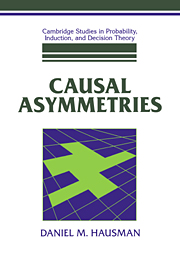Book contents
- Frontmatter
- Contents
- List of Figures
- Acknowledgments
- Introduction: Causation and its Asymmetries
- 1 Metaphysical Pictures and Wishes
- 1* Transfer Theories
- 2 Is Causation a Relation Among Events?
- 3 Causation, Regularities, and Time: Hume's Theory
- 4 Causation and Independence
- 4* Causation, Independence, and Causal Connection
- 5 Agency Theory
- 5* Causal Generalizations and Agency
- 6 The Counterfactual Theory
- 6* Independence and Counterfactual Dependence
- 7 Counterfactuals, Agency, and Independence
- 7* Agency, Counterfactuals, and Independence
- 8 Causation, Explanation, and Laws
- 8* Causation, Explanation, and Independent Alterability
- 9 Probabilistic Causation
- 10 Causation and Conditional Probabilities
- 10* Causal Graphs and Conditional Probabilistic Dependencies
- 11 Intervention, Robustness, and Probabilistic Dependence
- 11* Interventions and Conditional Probabilities
- 12 Operationalizing and Revising the Independence Theory
- 12* Probability Distributions and Causation
- 13 Complications and Conclusions
- Appendix A Alphabetical List of Propositions
- Appendix B List of Theorems
- References
- Index
1 - Metaphysical Pictures and Wishes
Published online by Cambridge University Press: 20 April 2010
- Frontmatter
- Contents
- List of Figures
- Acknowledgments
- Introduction: Causation and its Asymmetries
- 1 Metaphysical Pictures and Wishes
- 1* Transfer Theories
- 2 Is Causation a Relation Among Events?
- 3 Causation, Regularities, and Time: Hume's Theory
- 4 Causation and Independence
- 4* Causation, Independence, and Causal Connection
- 5 Agency Theory
- 5* Causal Generalizations and Agency
- 6 The Counterfactual Theory
- 6* Independence and Counterfactual Dependence
- 7 Counterfactuals, Agency, and Independence
- 7* Agency, Counterfactuals, and Independence
- 8 Causation, Explanation, and Laws
- 8* Causation, Explanation, and Independent Alterability
- 9 Probabilistic Causation
- 10 Causation and Conditional Probabilities
- 10* Causal Graphs and Conditional Probabilistic Dependencies
- 11 Intervention, Robustness, and Probabilistic Dependence
- 11* Interventions and Conditional Probabilities
- 12 Operationalizing and Revising the Independence Theory
- 12* Probability Distributions and Causation
- 13 Complications and Conclusions
- Appendix A Alphabetical List of Propositions
- Appendix B List of Theorems
- References
- Index
Summary
This chapter tells you where I started, explains how my initial hunches led to difficulties, and lays bare a fundamental ambivalence that nags the discussions in this book. It exposes unclarities in what I was looking for in a theory of causation.
Metaphysical Theories
In this century, metaphysics has been in ill repute. The word “metaphysics” conjures up an image of a philosopher envisioning “the essential features of reality” and then confidently dictating to artists, moralists, and scientists. Does metaphysics have any genuine content? Are there metaphysical questions that do not collapse into either empirical questions subject to scientific inquiry or semantic questions subject to conceptual analysis?
I sympathize with this “positivistic” skepticism concerning the possibility of conjuring substantive knowledge out of pure contemplation, and there is, I hope, no conjuring in this book. Although questions such as “What are the differences between causes and effects?” are more general than the questions scientists ask, they are not of a different kind. Metaphysical questions concerning causation are continuous with scientific questions. Although more abstract than theories in geology or sociology, the account of causation I defend in this book is intended as an empirical theory (jointly of nature and of human explanatory practices). This theory, like scientific theories generally, is acceptable only if it helps our beliefs and practices to fit together coherently.
The Question
One might say, “The explosion was caused by the foreman's striking a match,” or “Margaret's hitting the tomato with a hammer smashed it.” The second claim does not use the word “cause,” but smashing is a kind of causing.
- Type
- Chapter
- Information
- Causal Asymmetries , pp. 4 - 12Publisher: Cambridge University PressPrint publication year: 1998



